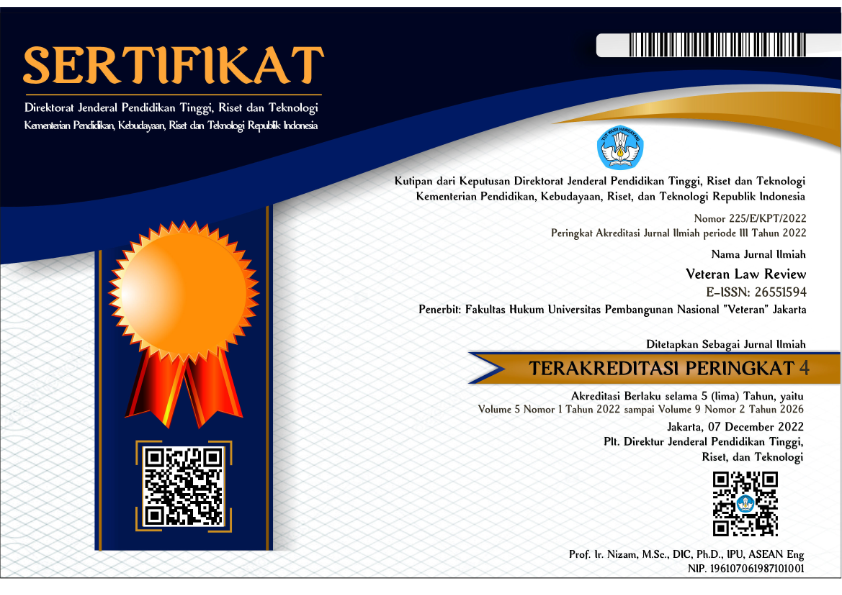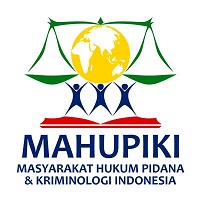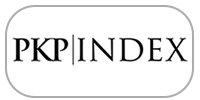Building Justice And Public Trust: Improving The Quality Of Judges Decision In Criminal Context
DOI:
https://doi.org/10.35586/velrev.v7i2.6850Keywords:
Judges; Decision; Justice; Trust, Criminal LawAbstract
In the process of adjudicating cases, the substantial values in judge decisions are often debated in the public sphere because of the disparity in several criminal decisions with similar events and light sentences (strafmaat) to law enforcement officers who commit corruption crimes, such as decisions at the appeals level. against a former prosecutor named Pinangki Sirna Malasari. Through conceptual approach, statute approach, and case approach, this paper attempts to answer two important questions, First, how to create quality decisions for the realization of justice and public trust? Second, how does the judiciary respond to public protests the court's decision which is considered to have imposed a low sentence on perpetrators of corruption? As a result of this paper, that quality decisions are made by judges by paying attention to legal justice, moral justice, and social justice with paying attention to the purpose of "preventive" sentencing to protect the community by placing criminals separately. from society and the purpose of "deterrence" sentencing is to create fear of committing crimes that can be distinguished for individuals, the public, and the long term. In addition, the judiciary should respond to public protests by establishing Special Guidelines in the Formulation of the Criminal Chamber of the Supreme Court which must be followed by judges.
Downloads
References
Journal Articles:
Mubangizi, Betty C and Maurice Oscar Dassah. (2014) “Public Participation in South Africa: Is Intervention by the Courts the Answer?”. Journal of Social Sciences, 39 (3). https://doi.org/10.1080/09718923.2014.11893290.
Nalbandian, Elise. (2011). “Sociological Jurisprudence: Roscoe Pound’s Discussion On Legal Interests And Jural Postulates”. Mizan Law Review, 5 (1). https://www.ajol.info/index.php/mlr/article/view/145483.
Schoenbaum, Edward J. (2001). “Improving Public Trust & Confidence in Administrative Adjudication: What an Administrative Law Judge Can Do. Journal of the National Association of Administrative Law Judiciary, 21 (1). https://digitalcommons.pepperdine.edu/naalj/vol21/iss1/.
Thilly, Frank. (1923). “Sociological Jurisprudence”. The Philosophical Review, 32 (4).
Books with an author:
Ali, M. Hatta. (2012). Peradilan Sederhana, Cepat dan Biaya Ringan Menuju Keadilan Restoratif. Bandung: Alumni.
Aristoteles. (2009). The Nicomachean Ethics, translated by David Ross.New York: Oxford University.
Cetak Biru Pembaruan Peradilan 2010-2035.
Cotterrel, Roger. (2018). Sociological Jurisprudence Juristic Thought And Social Inquiry. London: Routledge.
Huda, Chairul. (2006). Dari Tiada Pidana Tanpa Kesalahan Menuju Kepada Tiada Pertanggungjawaban Pidana Tanpa Kealahan. Tinjauan Kritis Terhadap Teori Pemisahan Tindak Pidana dan Pertanggungjawaban Pidana. Jakarta: Kencana Prenada Media.
Istanto, F.S. (2007). Penelitian Hukum. Yogyakarta: CV. Ganada.
Leiboff, Marett and Mark Thomas. (2004). Legal Theories in Principle. Sydney: Thomson Lawbook Co.
Manan, Abdul. (2008). Penerapan Hukum Acara Perdata di Lingkungan Peradilan Agama. Cetakan Kelima. Jakarta: Kencana Prenada Media Group.
Marzuki, Peter Mahmud. (2005). Penelitian Hukum. Jakarta: Kencana Prenada Emdia Group.
Muchsin. (2010). Kekuasaan Kehakiman Yang Merdeka (Independence Judiciary). Surabaya: Untag Press.
Mudzakkir. (2003). Eksaminasi Publik Terhadap Putusan Pengadilan: Beberapa Pokok Pikiran dan Prospeknya ke Depan. Jakarta: ICW.
Muladi. (2002). Lembaga Pidana Bersyarat. Bandung: Alumni.
Mulyadi, Lilik. (2010). Seraut Wajah Putusan Hakim dalam Hukum Acara Pidana Indonesia. Bandung: PT Citra Aditya Bakti.
Santoso, Agus. (2014) Hukum, Moral & Keadilan Sebuah Kajian Filsafat Hukum. Cetakan Kedua. Jakarta: Kencana.
Website Material:
CNN Indonesia. (2021) 15 Ribu Teken Petisi Desak Hukum Berat Jaksa Pinangki. Available online from: https://www.cnnindonesia.com/nasional/20210618133652-12-656194/15-ribu-orang-teken-petisi-desak-hukum-berat-jaksa-pinangki [Accessed October 25, 2023].
Taher, Andrian Pratama. (2021). Menyoal Putusan Banding Jaksa Pinangki & Tren Vonis Koruptor Rendah. Tirto. Available online from: https://tirto.id/menyoal-putusan-banding-jaksa-pinangki-tren-vonis-koruptor-rendah-ggUA Accessed October 25, 2023].
Peraturan Perundang-Undangan:
Undang-Undang Nomor 8 Tahun 1981 tentang Hukum Acara Pidana (Lembaran Negara Republik Indonesia Tahun 1981 Nomor 76, Tambahan Lembaran Negara Republik Indonesia Nomor 3209).
Undang-Undang Nomor 48 Tahun 2009 tentang Kekuasaan Kehakiman (Lembaran Negara Republik Indonesia Tahun 2009 Nomor 157, Tambahan Lembaran Negara Republik Indonesia Nomor 507).
Peraturan Mahkamah Agung Nomor 1 Tahun 2020 tentang Pedoman Pemidanaan Pasal 2 dan Pasal 3 Undang-Undang Pemberantasan Tindak Pidana Korupsi (Berita Negara Tahun 2020 Nomor 832).
Downloads
Published
How to Cite
Issue
Section
License
Copyright (c) 2024 Veteran Law Review

This work is licensed under a Creative Commons Attribution-ShareAlike 4.0 International License.
Copyright (c) 2022 Veteran Law Review Journal
Veteran Law Review © 2022 by Faculty of Law Universitas Pembangunan Nasional "Veteran" Jakarta is licensed under Creative Commons Attribution 4.0 International

1. License
The non-commercial use of the article will be governed by the Creative Commons Attribution license as currently displayed on Creative Commons Attribution 4.0 International.
2. Author(s)' Warranties
The author warrants that the article is original, written by the stated author(s), has not been published before, contains no unlawful statements, does not infringe the rights of others, is subject to copyright that is vested exclusively in the author, and free of any third party rights, and that any necessary written permissions to quote from other sources have been obtained by the author(s).
3. User/Public Rights
VELREV's spirit is to disseminate articles published are as free as possible. Under the Creative Commons Attribution-ShareAlike 4.0 International License. VELREV permits users to copy, distribute, display, and perform the work for non-commercial purposes only. Users will also need to attribute authors and VELREV to distributing works in the journal and other media of publications.
4. Rights of Authors
Authors retain all their rights to the published works, such as (but not limited to) the following rights;
- Reproduce the work
- Prepare derivative works based upon the work
- Distribute copies of the work
- Perform the work publicly
- Display the work publicly
- Copyright and other proprietary rights relating to the article, such as patent rights,
- The right to self-archive the article,
- The right to enter into separate, additional contractual arrangements for the non-exclusive distribution of the article's published version (e.g., post it to an institutional repository or publish it in a book), with an acknowledgement of its initial publication in this journal (Veteran Law Review).
5. Co-Authorship
If the article was jointly prepared by more than one author, any author submitting the manuscript warrants that he/she has been authorized by all co-authors to be agreed on this copyright and license notice (agreement) on their behalf, and agrees to inform his/her co-authors of the terms of this policy. VELREV will not be held liable for anything that may arise due to the author's internal dispute. VELREV will only communicate with the corresponding author.
6. Royalties
Being an open accessed journal and disseminating articles for free under the Creative Commons license term mentioned, author(s) are aware that VELREV entitles the author(s) to no royalties or other fees.
7. Miscellaneous
VELREV will publish the article (or have it published) in the journal if the article’s editorial process is successfully completed. JOSI's editors may modify the article to a style of punctuation, spelling, capitalization, referencing, and usage that deems appropriate. The author acknowledges that the article may be published so that it will be publicly accessible and such access will be free of charge for the readers as mentioned in point 3.

















